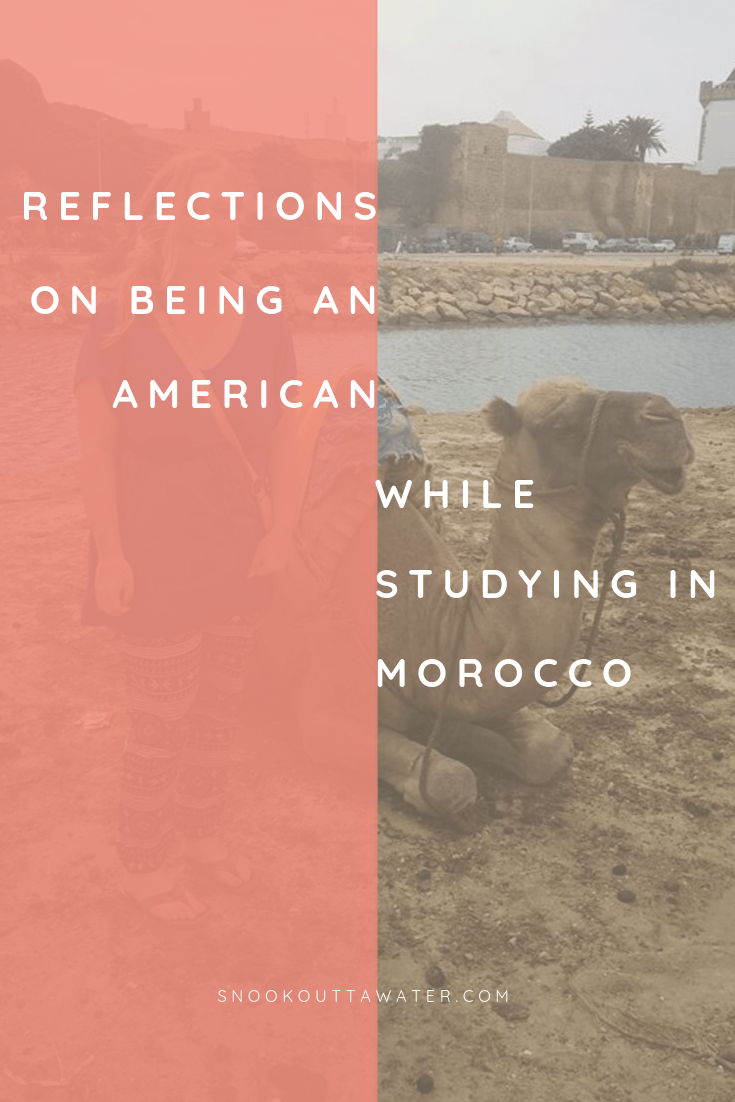Thoughts on Identity While Abroad in Morocco
It was a typical Thursday night when we left the boat bar, stomachs full of shitty free wine and the streets empty. My friend and I accepted a ride from a Moroccan man—she gave me that look before we hopped in, like Really, Emma?—but I was impatient, and preferred to not wait around for a taxi. He dropped us off, safe and sound, and I met up with him the next week for coffee. I should’ve known my Night Goggles never fail to disappoint me; he turned out to be 35 and balding, his hair greased and combed over the bald spot, as if that would stop me from noticing. He wore a silver studded leather jacket, spoke decent English, and ordered ns ns coffee, finding it way too amusing that I drank the same thing.
He was a DJ, and knew quite a few American rappers. He told me he loved American English. They say things like ‘Fuck you, n****!’ he said, spewing off other sentences that contained an over-usage of the n-word, which he seemed gleeful to use. I was glad the people around me didn’t speak English, and I tried to explain to him that that isn’t necessarily American English, but he ignored me, his right hand curled into the shape of a gun. Pow pow pow, he said.
For the first time in my life, my main identity was American—or, before they knew I was American, a Foreigner. I stuck out like a sore thumb, with my long blonde hair, my overly loud voice, my white skin, my incessant critical questions that people were hesitant to answer. And, with my American Card, I had the glory of being told all about America, as if I didn’t live there.
I tried hard not to stay in the Little American bubble—to learn the language, to meet Moroccans, to spend time away from a crowd of other Americans. I’d be embarrassed when we walked down the street in droves—look at us, I’d say. We’re all talking loudly in English, laughing loudly, callously ignoring those around us. The arrogance of us Americans. And I still agree with this—I hated being in the large group, and I generally hate being in large groups in America, too. If I am standing out, I like to stand out alone, not with ten or thirty other people.
But, gradually, I began to realize how hypocritical my stance was. I find it a positive attribute when immigrants come to America and retain their culture, refusing to assimilate. And when I do meet immigrants that are so American that they have shed their previous cultural beliefs or practices, I am disappointed. Why are their aspirations to become another bland ‘ole American? I never even took the time to dissect what the American culture was—because, to me, it was white, and uninteresting, and secular, and arrogant.
So, even though I wrote on the identity sheet I had to fill out that first week that I was in Morocco that I was “American,” I didn’t feel American. I’ve felt my whiteness, I’ve felt my femininity, my youthfulness, my New Yorkness. I’ve identified as those, but to be American? It was as if only through necessity that I felt American, because I was born there. But my identity—surely my identity didn’t revolve around that. Us Americans, we like to think we’re born shapeless blobs that we personally mold and polish, blobs that have a shield around them that block out things like poverty, family values, media, political ideologies. We’re obsessed by our self-made personal identities.
I remember the first time I went out late with my roommate in our new host family, and we came home to cotton stuck in the locks of our bedroom and bathroom doors. Did you see the cotton? It’s so the doors wouldn’t make noise when you came in late, our host mom said the next morning.
I laughed about this. It really made no sense, because the cotton made the doors bang close because the locks were jammed, which enhanced the sound she was trying to cover up. But I ignored the real reason she had put the cotton in our doors. After all, our university forbid them to enforce a curfew on us.
Then she told us her husband was sick. That he would stay up and worry about us. That Americans had gotten robbed late at night before. Then, she said our building completely shut down at 1am. No more doorman, no more code to unlock the door; even the keys stopped working. So, you have to be home by 1am, she told us.
At the time, I was furious. Who does she think she is? I said to my roommate, as she sat on her bed hysterically laughing. Lying to us like that, and right to our faces. The nerve!
We waltzed down the stairs, and asked the doorman if the building closed at one. The guy was so confused—after all, why in the world would an apartment building close down at one? We had verified proof that she had lied. I was steaming. I have half a mind to confront her, I told my roommate, who was probably still laughing. Tell her the doorman said there was no barnomage jadid.
Circular communication in Morocco can lead to somewhat extravagant lies rather than a real discussion, something I found particularly difficult because of how much I value honestly. The point was obviously not that her husband was actually sick, or that the cotton would make the doors quieter. But rather than being able to tell us up front how us going out late made her feel, she kept telling us information to persuade us to not go out (to set the record straight, we weren’t going out all the time — once a week at absolute most). And at the end of the day, when you study abroad in a country with different values, sometimes you have to make a choice between what your host family wants and your individual wants. And for us, my roommate and I had already had some money issues with our mom, so because of that I didn’t feel as guilty when it came to going out. Sure, I hated telling her when I was leaving, but usually I’d do it together with my roommate, and then we’d be on our way. Sacrificing my individualistic mindset to appease my host mother? It crossed my mind quite frequently, but it usually didn’t solidify into changing my actions.
Even minor issues continued to bother me. Three months in, and I’d still become irritated when my host mom would rush into my room and tell me to lower the blinds on the window, her eyes wide, as if it was some horrific thing. Why does it matter if my blinds are raised or not? It’s my room (was it really, though? not really). I was always fighting, always becoming prickly over the silliest of issues. Acceptance is hard for me. Losing independence, losing control over my life, is hard for me.
Even different forms of communication was difficult for me to adapt to. Quite early on, I went on a double date with a man from Guinea, and when he called me a few days later I told him I was busy this weekend, maybe next weekend. He then called me that next Friday eight times, one after the other. The first few I hadn’t answered because I was busy, but then I grew stubborn. Why is he continuing to call when I haven’t picked up? I thought it would subside quickly; he’d realize he was annoying, he’d realize I wasn’t answering, so he’d just stop calling, and things would fade away and we’d go our separate ways. But it didn’t stop. For weeks, he’d call and call, and for weeks I’d be too stubborn to answer, thinking that he’d get the hint. I finally called him, told him to stop calling me so much, that it was aggravating, and he went down to calling once or twice every couple of days. Progress! But this was a phenomenon I hadn’t been expecting—it happened over and over again with guys, and it confused the hell out of me. Calling repetitively was not viewed as abnormal. America has all these absurd, intricate rules regarding calling and texting, especially when it comes to the opposite sex. It hadn’t even crossed my mind that this type of communication could be viewed as a “cultural difference.” Is it an American thing to have too much pride to call someone more than once or twice?
I don’t think my reflections are anything profound—in fact, they’re scattered still, which is probably quite apparent —but it is a general trend that you realize your own personal identity more when you study or live abroad. After all, you’re the other, so you’re finally aware of your differences. My experience was no different, and it made me relax my reflex of rejecting everything American. I still have it—oh yes, it can come out in full force, especially when someone’s American Arrogance assumes that everyone speaks English, even when they’re in a country where the spoken languages do not include English.
But, it seems pretty futile to reject a culture that you are inherently a part of, a culture that you grew up in, a culture that has pervaded how you think, how you react, how you speak. Being American comes with certain stereotypes, some that are true, some that aren’t; but that’s part of the process, dispelling stereotypes and agreeing with other ones.
I realize now that my personal values and opinions are much more fossilized than I thought. I came to Morocco ready for some potential epiphany moments – and yet the only one I’ve stumbled on is that no matter how much I pretend to fight American capitalist values, critique the American government, and advocate for social justice, that those thoughts in and of itself makes me quite American. By attempting to understand a different culture, in reality I have begun to understand by own culture better instead, and slowly acknowledge how it has shaped me.
Liked this post? Pin it!

Subscribe to receive Snook Outta Water’s monthly newsletter with exclusive updates and content.

Leave a Reply